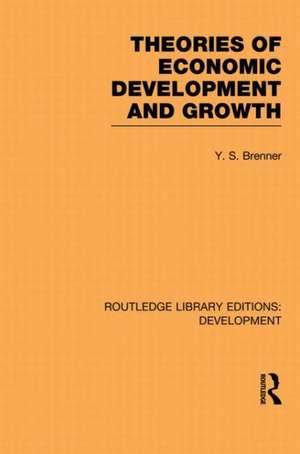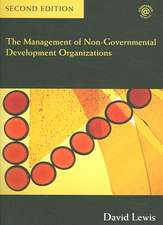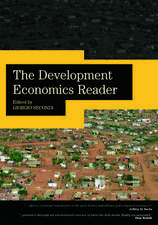Theories of Economic Development and Growth: Routledge Library Editions: Development
Autor Y. S. Brenneren Limba Engleză Paperback – 12 apr 2013
In addition there is a special survey of growth and of limiting factors in the economies of underdeveloped countries, with an important analysis of the economic results of planning in the USSR.
| Toate formatele și edițiile | Preț | Express |
|---|---|---|
| Paperback (1) | 329.88 lei 6-8 săpt. | |
| Taylor & Francis – 12 apr 2013 | 329.88 lei 6-8 săpt. | |
| Hardback (1) | 529.04 lei 6-8 săpt. | |
| Taylor & Francis – 26 noi 2010 | 529.04 lei 6-8 săpt. |
Din seria Routledge Library Editions: Development
-
 Preț: 386.77 lei
Preț: 386.77 lei - 33%
 Preț: 528.32 lei
Preț: 528.32 lei - 34%
 Preț: 823.99 lei
Preț: 823.99 lei - 34%
 Preț: 993.32 lei
Preț: 993.32 lei - 34%
 Preț: 822.01 lei
Preț: 822.01 lei - 34%
 Preț: 765.23 lei
Preț: 765.23 lei - 18%
 Preț: 1173.28 lei
Preț: 1173.28 lei - 34%
 Preț: 762.72 lei
Preț: 762.72 lei - 34%
 Preț: 824.17 lei
Preț: 824.17 lei - 34%
 Preț: 823.99 lei
Preț: 823.99 lei - 34%
 Preț: 765.95 lei
Preț: 765.95 lei - 34%
 Preț: 765.95 lei
Preț: 765.95 lei - 34%
 Preț: 852.88 lei
Preț: 852.88 lei - 18%
 Preț: 1064.01 lei
Preț: 1064.01 lei -
 Preț: 375.97 lei
Preț: 375.97 lei - 18%
 Preț: 998.43 lei
Preț: 998.43 lei - 25%
 Preț: 243.12 lei
Preț: 243.12 lei - 34%
 Preț: 763.07 lei
Preț: 763.07 lei - 34%
 Preț: 766.12 lei
Preț: 766.12 lei - 34%
 Preț: 824.89 lei
Preț: 824.89 lei - 18%
 Preț: 1059.48 lei
Preț: 1059.48 lei - 34%
 Preț: 850.02 lei
Preț: 850.02 lei - 34%
 Preț: 853.07 lei
Preț: 853.07 lei - 34%
 Preț: 765.40 lei
Preț: 765.40 lei - 34%
 Preț: 823.63 lei
Preț: 823.63 lei - 34%
 Preț: 1977.58 lei
Preț: 1977.58 lei - 25%
 Preț: 263.97 lei
Preț: 263.97 lei - 34%
 Preț: 822.01 lei
Preț: 822.01 lei - 20%
 Preț: 325.33 lei
Preț: 325.33 lei - 34%
 Preț: 821.82 lei
Preț: 821.82 lei - 18%
 Preț: 1063.65 lei
Preț: 1063.65 lei - 25%
 Preț: 249.56 lei
Preț: 249.56 lei - 34%
 Preț: 824.34 lei
Preț: 824.34 lei - 34%
 Preț: 825.78 lei
Preț: 825.78 lei - 34%
 Preț: 765.95 lei
Preț: 765.95 lei - 34%
 Preț: 996.03 lei
Preț: 996.03 lei - 18%
 Preț: 1064.70 lei
Preț: 1064.70 lei - 21%
 Preț: 320.94 lei
Preț: 320.94 lei - 34%
 Preț: 485.19 lei
Preț: 485.19 lei - 34%
 Preț: 824.34 lei
Preț: 824.34 lei - 25%
 Preț: 242.71 lei
Preț: 242.71 lei - 34%
 Preț: 764.34 lei
Preț: 764.34 lei - 24%
 Preț: 279.12 lei
Preț: 279.12 lei - 34%
 Preț: 850.73 lei
Preț: 850.73 lei -
 Preț: 399.87 lei
Preț: 399.87 lei - 33%
 Preț: 530.66 lei
Preț: 530.66 lei - 34%
 Preț: 851.46 lei
Preț: 851.46 lei - 18%
 Preț: 1058.79 lei
Preț: 1058.79 lei - 34%
 Preț: 762.36 lei
Preț: 762.36 lei
Preț: 329.88 lei
Nou
Puncte Express: 495
Preț estimativ în valută:
63.14€ • 65.07$ • 53.30£
63.14€ • 65.07$ • 53.30£
Carte tipărită la comandă
Livrare economică 03-17 martie
Preluare comenzi: 021 569.72.76
Specificații
ISBN-13: 9780415851640
ISBN-10: 0415851645
Pagini: 286
Ilustrații: black & white illustrations
Dimensiuni: 156 x 234 x 15 mm
Greutate: 0.45 kg
Ediția:1
Editura: Taylor & Francis
Colecția Routledge
Seria Routledge Library Editions: Development
Locul publicării:Oxford, United Kingdom
ISBN-10: 0415851645
Pagini: 286
Ilustrații: black & white illustrations
Dimensiuni: 156 x 234 x 15 mm
Greutate: 0.45 kg
Ediția:1
Editura: Taylor & Francis
Colecția Routledge
Seria Routledge Library Editions: Development
Locul publicării:Oxford, United Kingdom
Cuprins
1. Early Theories 2. The Classical Economists 3. The Dialectical Materialists 4. The Neoclassical Economists 5. The Theories of the Stages of Economic Growth 6. Contemporary Theories: A Survey 7. The Soviet Theories 8. The Theory of Growth and the Underdeveloped Countries Today.
Descriere
First published in 1966, this work summarises the theories of economic growth, both ancient and modern, and presents them in a form particularly suitable for university students, both in the developing world and elsewhere. The objective is to enable students to assess the major factors making for economic development and to encourage them to think about ways of applying their knowledge to the particular problems of their own countries.















